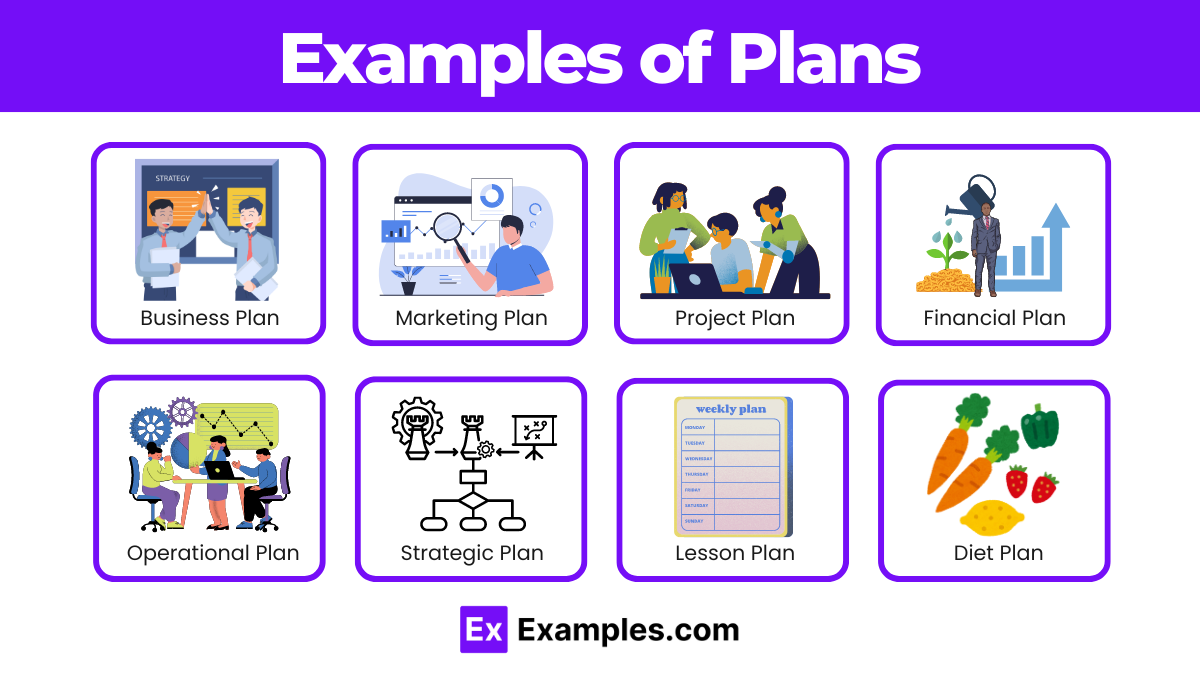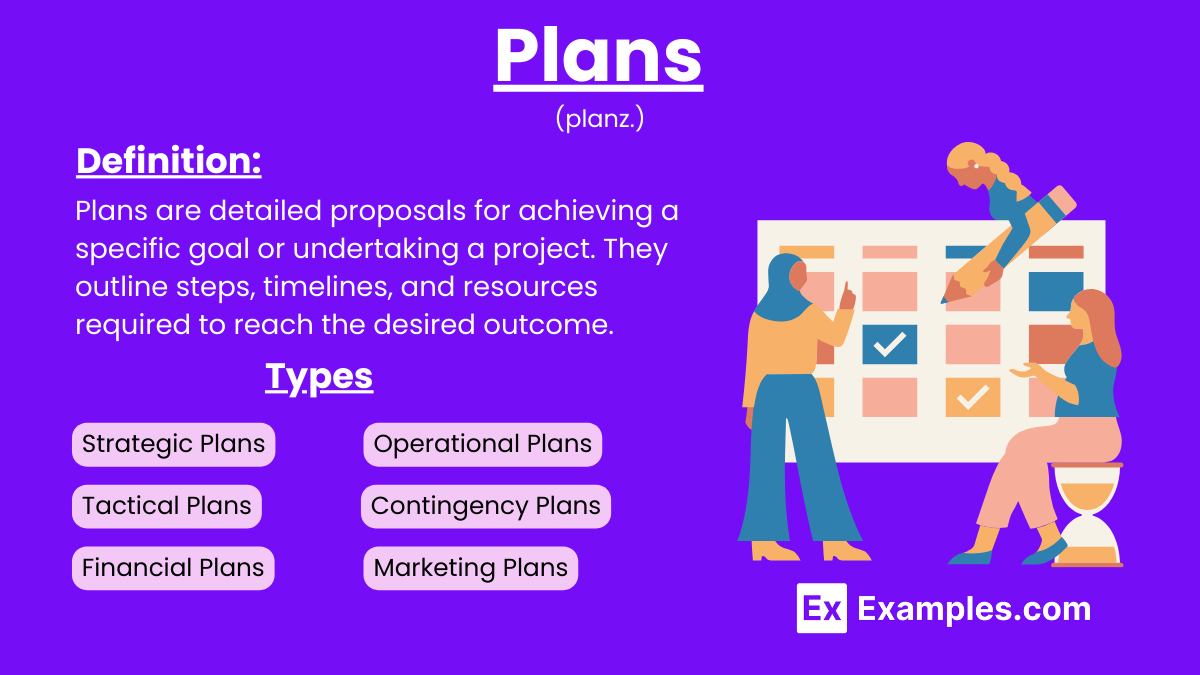Plans
Plans are essential tools for achieving specific goals and managing various scenarios effectively. They provide a structured approach to tackling tasks, addressing potential issues, and ensuring smooth operations. Training Action Plans focus on skill development and performance improvement. Crisis Communication Plans are designed to manage communication during emergencies, ensuring clear and effective messaging. A 90 Day Action Plan outlines short-term goals and strategies for new employees or projects. Communication Plans establish guidelines for internal and external communication, ensuring consistency and clarity.
What is Plan?
A detailed proposal or strategy formulated to achieve specific goals, outlining the necessary steps, resources, and timeline for execution. Plans provide a roadmap for organizing efforts and ensuring successful outcomes.
Examples of Plans

- Business Plan: A detailed document outlining a company’s goals, strategies, market analysis, and financial projections.
- Marketing Plan: A strategy for promoting and selling products or services, including market research, target audience, and marketing tactics.
- Project Plan: A comprehensive outline of project objectives, tasks, timelines, resources, and responsibilities.
- Financial Plan: A roadmap for managing finances, including budgeting, saving, investing, and managing expenses.
- Strategic Plan: A long-term vision and direction for an organization, focusing on achieving key objectives and goals.
- Operational Plan: A detailed plan outlining day-to-day operations, processes, and activities to achieve strategic objectives.
- Training Action Plan: A strategy for developing skills and competencies within an organization through structured training programs.
- Crisis Communication Plan: A framework for managing communication during emergencies, ensuring clear and effective messaging to stakeholders.
- 90 Day Action Plan: A short-term plan outlining goals and strategies for the first 90 days of a new role or project.
- Communication Plan: A strategy for managing internal and external communication to ensure consistency and clarity.
- Event Plan: A detailed outline for organizing and executing an event, including logistics, timelines, and resources.
- Contingency Plan: A plan for addressing unexpected events or emergencies, outlining alternative actions and resources.
- Career Development Plan: A strategy for personal career growth, including goals, skills development, and career path.
- Lesson Plan: A teacher’s guide for delivering instruction, including objectives, materials, activities, and assessments.
- Sales Plan: A strategy for achieving sales targets, including tactics, resources, and timelines.
- Disaster Recovery Plan: A strategy for restoring operations and data after a disaster, ensuring business continuity.
- Health and Safety Plan: A plan for ensuring a safe and healthy environment, including policies, procedures, and risk assessments.
- Diet Plan: A structured approach to nutrition and eating habits, designed to achieve specific health or fitness goals.
- Exercise Plan: A detailed outline of physical activities and workouts to achieve fitness and health objectives.
- Travel Plan: An itinerary for a trip, including destinations, activities, accommodations, and transportation.
- Retirement Plan: A strategy for saving and investing to ensure financial security during retirement.
- Estate Plan: A plan for managing and distributing an individual’s assets after their death.
- Study Plan: A schedule for organizing study activities and preparing for exams or assessments.
- Maintenance Plan: A strategy for the regular upkeep and repair of equipment, facilities, or systems.
- Growth Plan: A strategy for expanding a business, increasing market share, or developing new products or services.
- Budget Plan: A financial plan outlining income, expenses, and savings to manage finances effectively.
- Customer Service Plan: A strategy for delivering high-quality customer service and improving customer satisfaction.
- Succession Plan: A strategy for identifying and developing future leaders within an organization.
- Procurement Plan: A strategy for acquiring goods and services, including sourcing, purchasing, and managing suppliers.
- Public Relations Plan: A strategy for managing an organization’s public image and media relations.
Plans Examples for Students
- Study Plan: A schedule outlining daily or weekly study sessions, subjects to be covered, and specific goals to achieve during each session.
- Exam Preparation Plan: A detailed strategy for preparing for exams, including revision schedules, practice tests, and focus areas based on syllabus priorities.
- Career Development Plan: A roadmap for career goals, including skills to acquire, internships, networking opportunities, and milestones to achieve.
- Time Management Plan: A plan to allocate time efficiently for academics, extracurricular activities, part-time jobs, and personal activities.
- Project Plan: A detailed outline for completing a school project, including research, drafting, editing, and final submission timelines.
- Fitness Plan: A weekly schedule for physical activities such as gym workouts, sports, or yoga sessions, to maintain health and fitness.
- Reading Plan: A schedule for reading assignments, novels, or research papers, ensuring steady progress through the required material.
- Budget Plan: A financial plan for managing allowances, part-time job earnings, and expenses, helping students save money and avoid overspending.
- Internship Plan: A strategy for securing and completing internships, including application deadlines, required documents, and skills to focus on.
- Volunteer Plan: A plan for participating in community service or volunteer activities, detailing the organizations to join, hours to commit, and objectives to achieve.
Business plans examples
- Start-Up Business Plan: A comprehensive plan for a new business, including market research, business model, financial projections, and initial marketing strategies.
- Strategic Business Plan: A long-term plan focusing on the business’s overall goals and strategies, including growth objectives, market expansion, and competitive analysis.
- Operational Business Plan: A detailed plan outlining the day-to-day operations of a business, including production processes, staffing, and logistics.
- Feasibility Business Plan: A plan assessing the viability of a new business idea or project, including market analysis, cost estimates, and potential profitability.
- Expansion Business Plan: A plan for growing an existing business, including strategies for entering new markets, adding new products or services, and increasing market share.
- Financial Business Plan: A detailed financial plan focusing on budgeting, financial forecasts, funding requirements, and strategies for managing financial resources.
- Marketing Business Plan: A plan outlining marketing strategies, target markets, promotional activities, and sales goals to attract and retain customers.
Action Plan Examples
- Marketing Campaign Action Plan
- Product Launch Action Plan
- Employee Onboarding Action Pla
- Product Launch Action Plan
- Event Planning Action Plan
Types of Plans
- Strategic Plans: Long-term plans focusing on overall goals and objectives of an organization, such as business expansion plans and market entry strategies.
- Operational Plans: Short-term, detailed plans outlining day-to-day operations to achieve strategic goals, including production schedules and daily staffing plans.
- Tactical Plans: Specific plans designed to implement parts of a strategic plan, usually with a medium-term focus, like marketing campaigns and departmental projects.
- Contingency Plans: Backup plans to be used in case of unexpected events or emergencies, such as disaster recovery plans and crisis communication plans.
- Financial Plans: Plans for managing finances, including budgeting, saving, and investment strategies like annual budgets and retirement savings plans.
- Marketing Plans: Strategies for promoting and selling products or services, including social media marketing plans and advertising campaigns.
- Business Plans: Comprehensive documents outlining a business’s objectives, strategies, market analysis, and financial projections, such as start-up plans and expansion plans.
- Project Plans: Detailed outlines of project objectives, tasks, timelines, resources, and responsibilities, including software development plans and construction project plans.
- Personal Development Plans: Plans focusing on individual growth and career advancement, like professional development plans and career advancement strategies.
- Training Action Plans: Structured plans for skill development and training within an organization, including employee training programs and onboarding plans.
How to Write a Plan
Define Your Objective: Start by clearly stating the goal you aim to achieve. Make sure your objective is Specific, Measurable, Achievable, Relevant, and Time-bound (SMART).
Identify Resources and Requirements: List all necessary resources, such as personnel, finances, tools, and materials, required to achieve your objective.
Develop a Detailed Timeline: Create a timeline that outlines the major milestones and deadlines for your plan. Break down the timeline into smaller tasks or phases, detailing what needs to be accomplished at each stage and when it needs to be done.
Assign Responsibilities: Determine who will be responsible for each task or phase of your plan. Assign roles based on team members’ skills and availability, ensuring everyone understands their responsibilities and deadlines.
Establish Evaluation Criteria and Review: Define how you will measure the success of your plan. Set key performance indicators (KPIs) and metrics to track progress.
Uses of Plan
- Goal Achievement: Plans provide a clear roadmap for achieving specific objectives, ensuring that efforts are focused and organized.
- Resource Allocation: Plans help in identifying and allocating necessary resources, such as time, money, and personnel, effectively to avoid wastage.
- Risk Management: Plans allow for the identification of potential risks and the development of strategies to mitigate them, ensuring better preparedness for uncertainties.
- Decision Making: Plans serve as a reference for making informed decisions, providing a structured approach to evaluating options and outcomes.
- Performance Measurement: Plans include benchmarks and milestones that facilitate tracking progress and measuring performance against set goals.
Why are plans important?
Plans provide direction, improve efficiency, manage risks, and help achieve goals systematically.
How do I create a Monthly Action Plan?
Define objectives, list tasks, allocate resources, set deadlines, and regularly review progress for your Monthly Action Plan.
What are High School Strategic Plans?
High School Strategic Plans outline long-term goals and strategies for academic and operational improvement in a high school setting.
What is a Hospital Operational Plan?
A Hospital Operational Plan details day-to-day activities, resource management, and patient care strategies to ensure efficient hospital operations.
How often should I update my plan?
Update your plan regularly, at least quarterly, to reflect progress, new goals, and changing circumstances.
What is the purpose of a contingency plan?
A contingency plan prepares for unexpected events, outlining alternative actions to mitigate risks and ensure continuity.
How do you create an effective project plan?
Define project objectives, outline tasks, set timelines, assign responsibilities, and allocate resources for an effective project plan.
What should be included in a marketing plan?
A marketing plan should include market research, target audience, marketing strategies, budget, and performance metrics.
What role do plans play in business growth?
Plans guide strategic decisions, allocate resources effectively, and set clear goals, driving business growth and success.
Why is it important to have a Hospital Operational Plan?
A Hospital Operational Plan ensures efficient use of resources, improves patient care, and supports smooth hospital operations.



